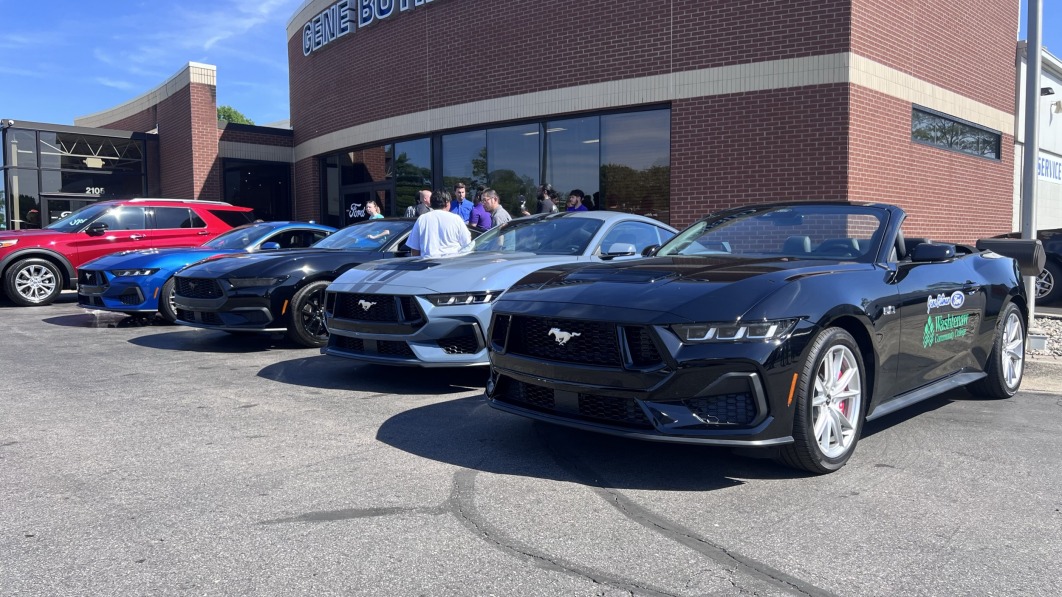YPSILANTI, Mich. — Last week, Ford donated four Mustangs to local schools in Washtenaw County to serve their automotive education programs. Pioneer High School, Huron High School, South & West Washtenaw Consortium, and Washtenaw Community College each took delivery of a Mustang at an event at Gene Butman Ford in Ypsilanti, just a jog down the road from Ann Arbor. Students and teachers were at the event and were able to finally drive away in the cars they’d be using as learning tools.
When I first heard about the donation, I thought it could make for an interesting local news story that enthusiasts would appreciate. But it served as an education about an entire ecosystem between automakers, dealers and educational institutions that helps keep the industry moving forward. Those car donations — of which there have been almost 300 from Ford alone since September — help supply students with career skills and employers with an educated, up-to-date workforce.
First, the cars …
The four Mustangs donated were all of the 2023 model year: three GTs (one a convertible) and one EcoBoost. Some were originally ordered by customers, some were headed into dealer inventory. These four cars suffered flood damage during a storm last year while parked at a holding lot in New Boston, Michigan, waiting to be loaded onto a train. Ford Market Area Coordinator Michael McLean described it as “level two” flood damage, “which means the water came only about as high as the carpet.”
Kenneth Lewis II, who teaches Auto Shop at Pioneer High School in Ann Arbor (and who also happens to be my karate instructor, and who clued me into the fact that the donation was happening in the first place), talked about plans for the Mustang his school received. It’ll be used for teaching basic technical skills for newer vehicles, and more. “We’re hoping to eventually do some fundraiser car shows, and we already have some partners that are going to donate some parts to the car so we can upgrade them and make them part of our high school drag program.”
I didn’t witness any burnouts at the donation event, but there were plenty of smiles accompanied by revving engines.




The donation program
I talked to Tom Butman, General Manager of Gene Butman Ford, the dealership that served as the liaison between Ford and the schools receiving the cars. His dealership had been holding onto the cars since November, as Tom worked on titling issues and dealership technicians cleaned and serviced the cars to make them able to be titled, and thus donated. That included removing odors, fixing wiring issues and corrosion, battery replacement — one car needed a new starter — and ensuring there wouldn’t be any mold or mildew that would affect air quality. Even though the students could have benefitted from doing some of the repairs themselves, the vehicles needed to achieve a certain standard, especially for safety, to be titled for donation.
Michael McLean spoke to me about the cars, as well as Ford’s Automotive Career Exploration (ACE) program, which offers “factory-level training to students and instructors, and it’s the same training our technicians are doing.” The cars were donated as part of this program. McLean told me that Ford’s program used to about 20-30 cars a year, but has donated almost 300 vehicles since September 2023.
First, McLean’s team identifies candidates for donation, such as vehicles damaged in transit or could otherwise not be sold as new — in this case, flood damage. Then they work with dealerships who can “sponsor” the vehicles, taking on expenses for transit, repairs and cleaning, and generally preparing them for donation. In this case, Ford reached out to Tom Butman, with whom McLean has worked with for technician recruiting, in part because of Butman’s networks with local schools.

The education
“A lot of these schools have old, outdated equipment and vehicles,” said McLean,” so I wanted to figure out a way we could, from a corporate standpoint, help get newer vehicles and technology into these schools.” McLean and his team began working harder to identify donor vehicles and working with dealerships and educators to get newer cars into students’ hands, “so when they enter the industry, they have some of that training done already.”
But shop programs in schools always seem to be in a precarious position. Ken Lewis described it like the pruning of a tree. The automotive education program might not be the prettiest part of the tree when the budget cuts come (and, hoo boy, I could tell you about the flabbergasting issues with the Ann Arbor Public Schools budget, but your community might very well have its own), and people simply don’t realize how important it is. These programs, after all, are a pipeline upon which the automotive industry relies.
And as Dan Retherford, Service Manager at Gene Butman Ford, told the crowd gathered for the donation event, “Over the last few years, so many schools have decided that [auto repair programs are] not a viable type of curriculum.”
But the schools have good partners. There are over 1,500 schools (high schools and beyond) enrolled in Ford’s ACE program, with vehicle donations going all over the country, including Hawaii. Kenneth Lewis also explained that Tom Butman is part of his program’s accreditation advisory committee, “so he’s always at our schools, always talking to us about things that we can do to make our program better. And so when this opportunity came up, obviously his first thought was us, which is awesome.”
Lewis also noted that before the Mustang donation, Pioneer’s nicest shop vehicle was a 2012 Hyundai Elantra, which was rear-ended and donated from an insurance company. “That’s typically how we get newer vehicles. They come in mostly destroyed.”
In addition to providing a learning platform with the latest technology, and something that can provide more opportunities for fundraising and events, having something like a new Mustang is also good for student retention, Lewis said. He feels that some auto programs disappear from schools because the students don’t connect with cars that aren’t even from their time. “Having something newer helps those students feel more engaged with the lessons that they’re getting.”

The jobs
It behooves the automakers and dealerships to supply these students with up-to-date technology, as these students are a pool they draw from for their workforce. Hence the donations, hence the relationships with dealerships who in turn have working relationships with the schools.
I asked Tom if he’d ever recruited technicians from the schools. “Oh yeah,” he replied, beaming, “some of our best,” before recounting the education and career histories of individuals from Butman’s service department.
“We’re at a point right now where these technicians have to know so much between the different types of technology,” said Tom Butman. “And it’s not just powertrains. It’s also connectivity, it’s compatibility, it’s also HVAC, it’s hydraulics — it’s so daunting thinking about everything they need to know.”
And finding the talent isn’t always easy. Well-versed technicians “are very much in demand,” Butman said. “The compensation level for these individuals is kind of, the sky’s the limit at this point.”
Kenneth Lewis noted that, in addition to Ford, his program also has a good relationship with Toyota. “A lot of our students at Pioneer, specifically, do go over to Toyota to work” through their apprenticeship programs or through dealerships. “I try to bring as many manufacturers and dealerships in, and even local shops, independent shops, to come in and see our students and talk to them and try to offer them internships and co-ops, so that we can try to help as much of the industry as possible.”
Of course, other automakers and educational providers have a stake in teaching and accrediting the next generation, too. Just take a look at the ASE Education Foundation website for examples.

What’s next?
Dan Retherford told the students at the event, “You guys are in an exciting time … With the advancements of hybrid, plug-in and electric, we are at an inflection point of a technological advancement in this industry.” He added, “Being into engine performance and such is great, but … I challenge you, if you really want to be the next Carroll Shelby, find out how you get more distance, power and whatnot, and use less energy, out of a battery, an electric motor. Think next level. Anybody can cut holes in their exhaust and put a can on it.”
Tom Butman agrees. Electric vehicles “are the next step,” he said. He pointed out that Washtenaw Community College is launching its EV maintenance and battery technician program with a few Ford vehicles and a Tesla in its fleet (it’s also launching charging station installation and semiconductor technician programs). Getting those programs into high schools is the next step. “But it’s tough,” Butman said, “because you have to have strong connections with the manufacturers to find how to work on those, because they’re so new, and the technology is so much different than before.”
“I have actually been trying to get an EV for years,” Kenneth Lewis told me, but the cost is a barrier. “We’ve been looking for partners to try to help us out. Hopefully we can come up with one soon, or some type of grant, but that’s something that’s been in the works for a while.”



